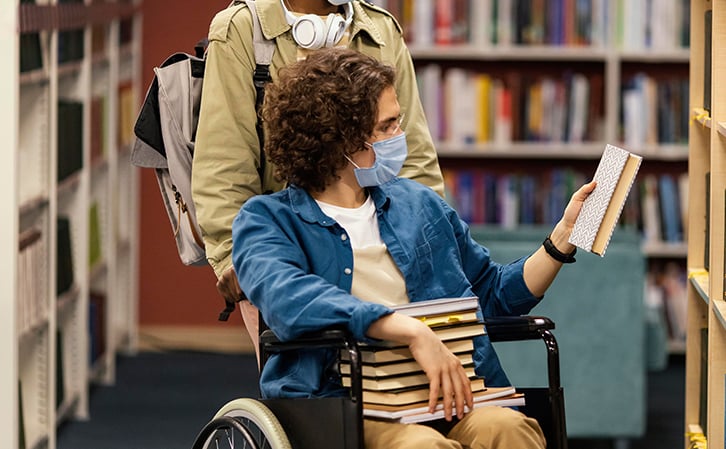What I Wish I Knew About Going to College with a Spinal Cord Injury When I Was First Injured

One of the best things you can do if you have a spinal cord injury is get an education. Some people already have a degree before their injury, but if you need to go to college with a spinal cord injury, there are several things you should know to ensure you have the best college experience possible.
Thanks to the ADA and laws predating the ADA that helped make education accessible to everyone in the US, a fully accessible college experience is your right. Read on for important things people with a spinal cord injury wish they would have known before going to college.
Colleges Want You
Many people are worried that a college will not want to accept them if they discover they have a disability. This could not be farther from the truth for most colleges. Most colleges see the benefit of having intelligent people with disabilities on-campus, hoping they can help educate the student body population on important disability issues. Make sure to include your disability in your letter when applying.
And on the off chance a college does not want students with physical disabilities, it is likely due to them being ignorant or worrying that their college campus is not accessible enough, which can be the case for many private colleges, which are exempt from the ADA.
Campus Accessibility Can Vary Widely
Despite the existence of the ADA requiring all public facilities to be accessible, this sadly only applies to public colleges and universities. For the thousands of private colleges across the US, they are not obligated to make their campuses accessible however many still have made the adjustments, believing it is the right thing to do.
It is extremely important that you tour every campus in person before making any final decisions. Also make sure to visit the entirety of the campus, from the cafeteria to student housing, to make sure wherever you’re traveling on-campus is accessible.
The Government Will Pay Your Tuition
If you have a certified disability and decide to attend a public university, the government will pay for your full tuition thanks to the Department of Rehabilitation Services (DRS). It is important that you get a DRS counselor as soon as possible to help assist you with this funding. Also, there are several spinal cord injuries scholarships available that will pay for a huge portion if not all of your tuition. Check out this list for the scholarships available (link on site?).
Don’t Be Afraid to Ask for Accommodations
For many students with spinal cord injuries, they will need special accommodations in class, whether this means a desk that is accessible, assistance with note-taking, or extended time for taking tests. Special accommodations for students with disabilities are a requirement of the ADA, which is why you should not be shy when asking for accommodations you may need.
Have Fun
College can be a stressful and expensive endeavor but remember it is also a time in your life to have fun, especially if you're attending on-campus. Whether you plan on attending college for 2 or 8 years, many people reflect on these years as some of the most important of their lives and regret not taking full advantage of all the different opportunities that made themselves avail. From political groups to recreational groups, try to be involved as much as you can, and do not let your spinal cord injury stop you.
Your college experience is one you should treasure. We hope that this advice has helped you see what an amazing time it is and how you can succeed despite having a spinal cord injury. Not get out there and learn.
Stay Updated on Advancements On Traumatic Brain &
Spinal Cord Injuries
About the Author




